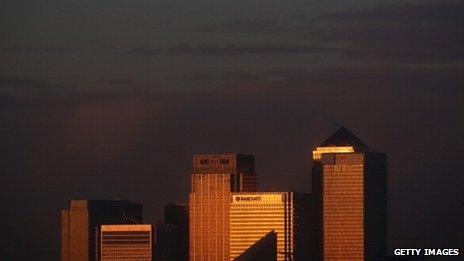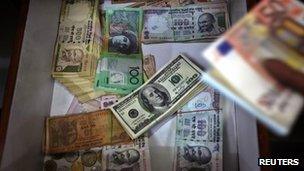Banks warned about exchange rate dangers in 2009
- Published

The banking sector has been hit by a number of scandals in recent years
Banks knew of unusual currency trading at a key period during the trading day four years before regulators began investigating manipulation of the so-called "London fix".
The 'London Fix' is an important rate set by counting currency trades over a one-minute period at 4pm.
Reports seen by the BBC show how bank analysts had noticed sharp movements in exchange rates.
Banks even warned their clients about trading at that time.
Rate manipulation
Analysts warned trading at 4pm could have a 'debilitating' effect on investments, costing up to 5% annually.
The London fix is widely used by pension funds and other investors to value portfolios and set a price for deals.
Separate rates are calculated for each pair of currencies, such as the Euro and US Dollar, or the Pound and the US Dollar.
The rates hit the headlines in October, when Barclays suspended six traders, and RBS suspended two traders in connection with the regulators' inquiry. Fifteen banks have been contacted about this issue, including Citigroup, Deutsche Bank and UBS. At this time no-one is formally accused of wrongdoing.

London is the global centre of currency trading
The suggestion is that traders colluded to push through high volumes of trades in the run-up to and during the window to influence rates.
'Surprising revelation'
But research by Morgan Stanley and seen by the BBC shows that banks were already concerned about the London fix in 2009 - four years before the investigations were announced.
It noted unusually sharp movements in exchange rates around 4pm, concluding that anyone trading at that time is unlikely to get the best possible deal available that day, increasing the costs of currency trades.
It calls this a "surprising revelation," since the "prevailing consensus" is that the 4pm London fix is the "optimal" time to trade.
Though small, these added costs can mount up significantly over a year's trading.
"In the worst case scenarios, these costs can even begin to have a debilitating effect on annual performance," says the report, entitled 'A Guide to FX Transaction Cost Analysis, Part 1'.
These conclusions are based on an analysis of real data for the US Dollar/Euro exchange rates. The report speculates that the impact could be even worse on less widely traded pairs of currencies.
Part 3 of the series estimates the potential losses at up to 5% annually on a typical investment portfolio - which would more than wipe out all the interest income of many investments. None of the reports allege any illegality.
Regulators unaware
Paul Aston, author of the report, now works in New York at the financial firm TD Securities. He said some investors had started moving away from trading at the fix, but many are still using it.
Asked why regulators had not intervened when his report was written, he said that foreign exchange "is the widest, freest, global market that there is, so in order to have any kind of regulatory effectiveness in this market you have to have very tight co-ordination over multiple jurisdictions," something which would be difficult to achieve.
"I also don't think that regulators were aware of how the market works, or the uses of currencies," he said.
David Ruffley MP, a member of the treasury select committee, told the BBC: "I think it's fairly clear that everyone in this country who has shares in pension funds, and that's most of us one way or the other, will have seen a fall in the value of those shares as a result of this."
"And that's not a politician saying it - it is what a bank was telling its own customers in 2009."
He has written to the Serious Fraud Office, requesting that they run an investigation in parallel to the Financial Conduct Authority's probe.
- Published1 November 2013
- Published31 October 2013
- Published30 October 2013